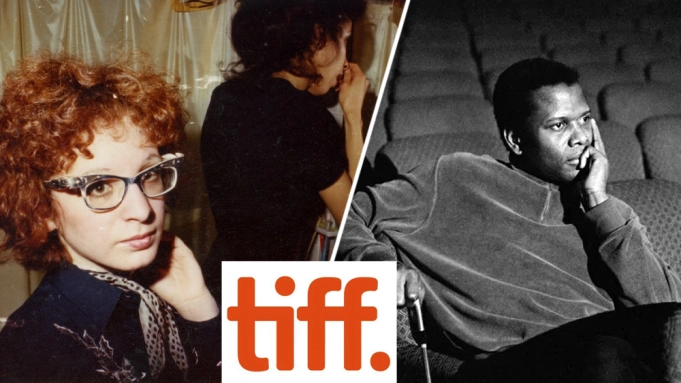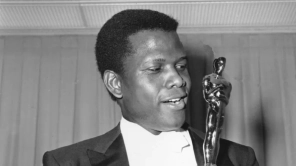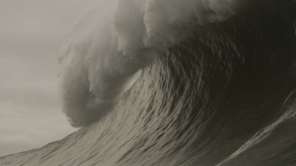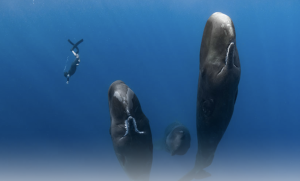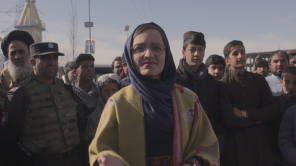Poitras, Poitier & ‘Patrick’: TIFF’s Documentary Premieres Throw Awards Race Into Focus
Adam Benzine | Deadline
The Oscar race came into sharper focus at this year’s Toronto International Film Festival, with actors like Brendan Fraser and Michelle Yeoh cementing their lead contender status, and big-budget studio efforts like The Fablemans and Glass Onion premiering to raves.
The fall superfecta – Venice, Telluride, Toronto and New York – is the traditional launchpad for the prestige dramas that go on to vie for Best Picture. But for documentaries, it’s a different story.
Analyzing the last 10 years of Academy Award nominees for Best Documentary Feature, most premiered early in the eligibility year, typically at Sundance. But a fortunate few have launched as late as the fall, arriving with such noise and momentum that they rise to the top and earn one of the five slots among the year’s most prestigious nonfiction films.
Stanley Nelson’s Attica accomplished that last year, launching at TIFF in 2021. A second Oscar nominee, Jessica Kingdon’s Ascension, screened at Tribeca in June 2021 (the other three nominees – including eventual winner Summer of Soul – premiered at Sundance).
A handful of other docs have pulled off a late-in-the-year shock-and-awe campaign that leads to glory – in recent years we’ve seen that happen with My Octopus Teacher (September via Netflix), Free Solo (September via TIFF) and Citizenfour (November via NYFF). But it tends to be the Sundance docs, which this year include the seven-figure-grossing Fire of Love and timely political doc Navalny, that go on to win.
All of which is to say, if only one fall premiere can make it to the Dolby Theatre next March, it will be Laura Poitras’s Nan Goldin doc, All the Beauty and the Bloodshed, which has launched not only as a strong contender for an Academy Award nomination, but could take home the trophy. To do so would make Poitras only the second female director to win two Oscars, following her 2015 win for Citizenfour, and in the footsteps of the legendary documentarian Barbara Kopple.
The film beautifully and somberly charts the life of artist and activist Goldin, from her early years as an avant-garde photographer, to her more recent activism against OxyContin giants the Sackler Family. It offers an elegant intersection for photography, queer culture, art, sexuality, mental health, suicide, the AIDs and OxyContin crises, and the pitfalls of corporate philanthropy and reputational whitewashing, without ever feeling like any of those (very Oscar-friendly) topics is being forced in. Goldin’s photos of New York’s LGBTQ community in the 70s and 80s are truly remarkable. The film is quite brilliant, and by its end I was very moved.
At Venice, it became only the second documentary to win the festival’s top prize, the Golden Lion. And at TIFF, where I saw it, fellow filmmakers such as Jennifer Baichwal, and execs from rival streamers including Netflix, appeared visibly shaken in the lobby of the Scotiabank Theatre.
It has also landed a prime slot at the New York Film Festival and is cooking with gas, as they say. In Toronto, Poitras also stirred one of the more newsworthy moments of the festival, using her Q&A with programmer Thom Powers to criticize festivals for programming glossy docs from politicians such as Hillary Clinton, who – as Secretary of State in the Obama administration – was arguably complicit in the effort to prosecute Wikileaks founder Julian Assange.
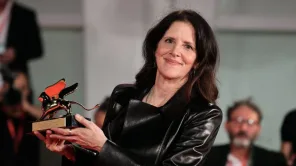
There was immediate discussion as to whether Poitras’s surprise comments would help or hinder her film’s awards campaign. My sense is they will help. (Poitras is right, in my view – if politicians such as Clinton want to come to film festivals as documentarians, and not just special guests, then we need to hold their feet to the fire with regards to past conduct – especially as it relates to journalists and whistleblowers).
“Hard questions should be asked,” said Poitras, expressing a laudable sentiment that – it must be said – was somewhat undermined by her reps’ refusal to make the filmmaker available for interviews about her own Golden Lion-winning doc.
All the Beauty and the Bloodshed was acquired just before its Venice premiere by HBO Documentary Films, which now finds itself in its strongest position in years heading into awards season. HBO once enjoyed a firm grip on the Doc Oscar race, but in recent years has lost ground to deep-pocketed streamers such as Netflix and Disney.
Now, not only does HBO have U.S. rights for Poitras’s latest, but it also has Navalny – Daniel Roher’s brilliant CNN Films documentary about poisoned and imprisoned Russian opposition leader Aleksei Navalny; Shaunak Sen’s acclaimed All That Breathes (winner of the Grand Jury Prize for World Cinema Documentary at Sundance and the Golden Eye award at Cannes); and Brett Morgan’s Moonage Daydream (released theatrically by Neon), an inspired, surreal, immersive – and slightly overlong – portrait of genius musician David Bowie.
The latter is a breath of fresh air and quite unlike any other music doc I’ve seen in a long time. But its trippiness, length and unconventional structure may polarize.
One other documentary emerged as a strong potential contender in Toronto: Sidney, a warm biopic of legendary actor Sidney Poitier, from Oscar nominee Reginald Hudlin (Django Unchained) and producer Oprah Winfrey.
Stylish and timeless, Hudlin’s film pulls no punches as it guides us through the life of the groundbreaking thespian – the first Black man to win the Oscar for Best Actor – by way of a generous original interview with the screen legend, a healthy smattering of clips from his best-known films, and a veritable who’s who of talking heads.
It’s impossible to overstate the affection Hollywood has for Poitier, who passed in January at the age of 96, but the rollcall of Black entertainment industry royalty that pays tribute in the film – among them Morgan Freeman, Halle Berry, Quincy Jones, Denzel Washington, Spike Lee, Lenny Kravitz and, of course, producer Winfrey – should give a clue as to how well it will play.
It also helps that the film isn’t a total hagiography – the look of sadness on the face of Poitier’s first wife, Juanita Hardy, when she describes the actor setting up a love nest for his mistress, is heartbreaking and memorable. Apple TV+ will push this one hard and rightly so. And if it gets nominated, it could win.
Of course, awards are only one metric of a film’s merits (and, let’s be honest, a metric that we focus on a little too much.) There were many other TIFF docs that I loved, which look set to enjoy long festival runs and much public discourse. Many still have distribution or other question marks over them.
Chief among the highlights was Free Money, Sam Soko and Lauren DeFilippo’s eye-opening exploration of the ethics and implementation of Universal Basic Income, in which idealistic Silicon Valley philanthropy clashes with real world pragmatism. From a shiny office in New York, a tech thought leader for Google-backed charity start-up GiveDirectly discusses the radical and laudable notion of using technology to end extreme global poverty, beginning with a small-scale trial in Kenya.
Meanwhile, 12,000 kilometers away across the ocean, GiveDirectly’s African representative offers a blunter explanation to bemused, wary residents in the tiny village of Kugutu, who cannot fathom why some rich Americans would want to give them $22 a month for the next 12 years.
“We want to experiment in countries where people are poor,” says the rep, candidly, in a film that’s full of such wry insight. I can also see the movie prompting a lot of conversation within the documentary community, where films about global poverty have – for the longest time – been mostly made by well-meaning Western outsiders.
Also a hit: Stephanie Johnes’ beautiful and inspiring Maya and the Wave, which follows the injury, rehabilitation and comeback of world-champion Brazilian surfer Maya Gabeira. Teased as a glossy, Red Bull-style sports doc, the film is actually much more like Lucy Walker’s brilliant 2013 effort The Crash Reel, which – on the surface – appeared to be about snowboarding but was actually about recovery from traumatic brain injury.
For much of Maya, we follow Gabeira as she battles both sexism and extreme physical rehabilitation, following a horrific surfing accident at the film’s start. It isn’t until the third act that we really see her triumphant return to the waves. And when it comes, it’s magnificent.
They can’t all be hits, however, and one doc landing with a real thud was Mark Fletcher’s Patrick and the Whale, which was tipped pre-fest as a feel-good nature doc in a similar vein to Netflix’s My Octopus Teacher.
It’s easy to see the similarities on paper. A middle-aged, well-to-do white guy (in this case marine videographer Patrick Dykstra) seeks to bond with an intelligent creature of the sea, while at the same time addressing the bigger questions in his own life. In this case it’s a mammal, rather than a cephalopod.
But where Pippa Ehrlich and James Reed’s Oscar-winner was possessed of a certain charm and ponderous introspection that befitted the moment of pandemic lockdown, Patrick and the Whale just sinks.
At the heart of the problem: the unlikability of the titular character (no, not the whale, the other one), negating the film’s otherwise beautiful cinematography. Dykstra comes across as alternately arrogant, uninteresting and un-insightful, with a stunning inability to read the situation. And while that might’ve played well as an ironic, Grizzly Man-esque portrait of one man’s naïve disregard for nature’s boundaries, the filmmakers’ decision to play the doc straight leads instead to frustration.
The majestic whales featured in the film appear entirely indifferent to Dykstra’s presence, except at one point where, after spending an hour trying to suction-cup a GoPro to the jaw of the cetacean, the frustrated whale eventually shoos Patrick away. “In that moment, she blanked me,” Dykstra later says, melodramatically, tears forming. One can relate. To the whale.
It wasn’t the only doc to be poorly received at the fest. Tamana Ayazi and Marcel Mettelsiefen’s female Afghan mayor doc In Her Hands – from aforementioned executive producer Clinton – also misfired, premiering to a tepid response. As did the Clintons’ other major nonfiction project, the forthcoming Apple TV+ series Gutsy.
In the past, AMPAS members have oft made space for films about current affairs, such as the Tahrir Square protests in Egypt (The Square), the European refugee crisis (Fire at Sea), Brazilian authoritarianism (The Edge of Democracy); and the Maidan uprising (Winter on Fire: Ukraine’s Fight for Freedom.)
It’s hard to imagine the Doc Branch will not make space for at least one Ukraine-focused doc this year, and director Evgeny Afineevsky could find himself back in contention with his follow-up to Winter on Fire, the aptly titled Freedom on Fire, which played to strong reviews at TIFF after opening in Venice, but which is yet to find distribution.
Another Ukraine-themed documentary, Mantas Kvedaravičius’s Mariupolis 2, which screened at TIFF after premiering in Cannes, is also a potential contender. Kvedaravičius was killed during the making of the film – reportedly murdered by Russian soldiers – and the slow but moving portrait of the conflict was finished by his fiancée and co-director Hanna Bilobrova. It’s the ultimate sacrifice a filmmaker could make.
One final thought: With the Golden Lion victory and rapturous reception for All the Beauty and the Bloodshed, I’m sure we’ll inevitably see a slew of awards op-eds questioning whether this could finally be the year when a documentary breaks through and lands a Best Picture nomination – especially given that it looks to be a slightly weaker year for drama contenders.
My sense is that, sadly, this won’t be the film to break that glass ceiling. Not least because actors remain AMPAS’s largest constituency, comprising about 14 percent of its overall membership. And actors tend to vote for movies that feature… well, actors.
Like Sidney Poitier.

